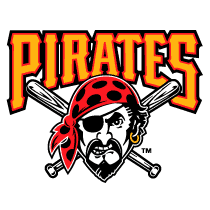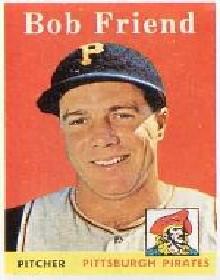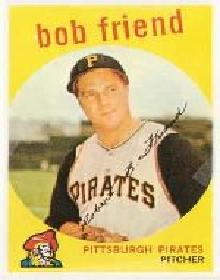






 |  |  |  |  |  |  |
 |
 |
Friend was considered one of the most consistent and solid pitchers in the game, even considering the time he played in. Some remarked that he would not miss a start if he was dying. After he attended Purdue University, the Pirates became interested in Friend, signing him in 1950. His first season with them was a full one, and Friend went 6-10, not getting much run support from a horrible Pirates team that finished 6th in the 8-team league in batting average and last in stolen bases. His ERA was 4.27 as he switched off as a starter and a reliever in his rookie year, starting 22 games in 34 appearances.
1955 was clearly Friend's breakout season. The native of Indiana struck out 98 batters in 20 starts and 44 games. His 2.83 ERA was best in the National League but he ended with only a 14-9 record, again due to a terrible hitting Pirates team that this time finished 8th in an 8-team league in runs scored, hits, and home runs. Friend was easily the best pitcher on the team, finishing with the best ERA, the most wins, the most appearances, and the most strikeouts. Teammate Vern Law took 2nd place in most of those categories. Talk of Friend being the best pitcher in the league was legitiment as well, with his ERA beating out even Don Newcombe (3.20), future Cy Young Award and MVP Award winner. Most say Friend would have won it in 1955, the year before the award was first given in 1956.
In 1956, Friend's statistics would improve drastically in some areas. In others, however, they were not as impressive. On the year, he was 17-17 with a 3.46 ERA and 166 strikeouts, 68 more than the year before. Other stats that improved included those falling under the endurance category. He pitched an amazing total of 314 innings (1st in the league) and started 42 games (1st in the league) in 49 appearances. He also had 19 complete games (3rd in the league) and 4 shutouts (4th in the league). Friend's career looked to be on its way to the record books.
Friend didn't slow down after that, picking up outstanding 1957 and 1958 seasons. By 1957, he was only a starter basically. In 1958, his run support came as well and the Pirates finished in 2nd place. Friend went 22-14 that year, and his 22 wins were good for a tie for 1st in the league with Warren Spahn. He made his second All-Star game and came the closest to winning the Cy Young Award (3rd place). He continued his success into the 1960s.
After an average year in 1959 for both him and his team, his career high in strikeouts (183) came in 1960, and his only trip to the World Series (See: 1960 World Series) came as well. The Pirates would win in a truly memorable world series against the New York Yankees, winning Game 7, 10-9. Although his team beat the Bronx Bombers, Friend's World Series was pretty weak, almost squandering the game for the Pirates in Game 7, when he let the Yankees come back from 2 runs down and tie the game. His postseason stats stand at an 0-2 record with a 13.50 ERA in 6 innings pitched.
In 1962, Friend tied for the league lead in shutouts with Bob Gibson (5). That year, he went 18-14 with a 3.06 ERA and pitched 261 innings. In 1963, Friend eclipsed his previous career best in ERA, when he ended the season with a 2.34 ERA and 17-16 record. On April 13 of that year, Friend gave up Pete Rose's first Major League hit. That game, the major league record for balks occurred, with 7 (4 by Friend).
Friend's final complete season, and final season with the Pirates came in 1965. He went 8-12 with a 3.24 ERA in 34 starts before being traded to the Yankees for Pete Mikkelsen after the season. After being moved again, Friend played his final game with the Mets on September 24, 1966. Friend remains the only pitcher to lose more than 200 (230), while winning less than 200 (197), mostly due to playing with 5 last place Pirate teams.
Friend ended his career with a 197-230 record and a 3.58 ERA. He had 1734 career strikeouts in 3611 innings pitched. Friend pitched 36 shutouts in 163 complete games. In 602 career games, he gave up 1438 earned runs. He hit 46 batters in his career.
As a batter, Friend hit .121 with 2 home runs and 60 RBIs, three coming on May 2, 1954 in an 18-10 win against the Chicago Cubs. He is considered by many to be one of the most historically important pitchers of all time.
Bob Friend was the first major league pitcher ever faced by John Kennedy, the first black player in Philadelphia Phillies history. Friend retired him on a grounder to shortstop Dick Groat.

 |  |  |  |  |  |  |